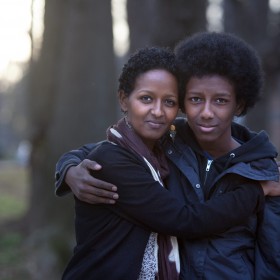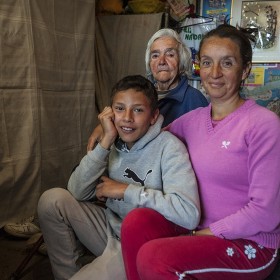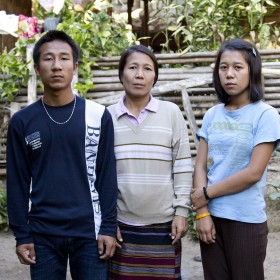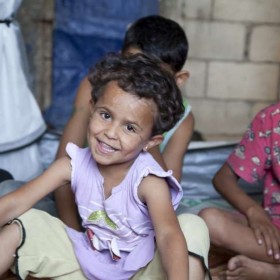Bathoul’s Story, Lebanon
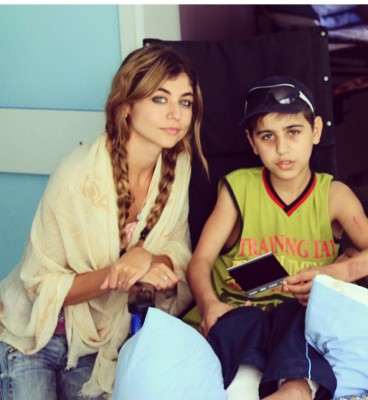
Bathoul meeting 11 year old Khaled. Photo by B. Ahmed/2014.
I will never forget when I asked 11 year old Khaled as he sat in his hospital bed with 46% burns to his body what he wanted to do when he gets older. He looked away and then down at his blood stained bandaged legs. Silence. He then said ‘I don’t think about that any more’. As a sister to two younger brothers I could almost hear my heart break. I couldn’t imagine my little brother going through life without dreams. What is the meaning of life if we don’t have dreams and aspirations? If children as young as 11 are giving up on their hopes and dreams, is humanity not at a loss?
Khaled was working at a mechanics when he got burnt. It was his second job since he arrived in Lebanon. His father had lost his job when Khaled felt it was his duty to find work to support his family. He first got a job picking olives but it wasn’t enough. It was then he found work as a mechanic’s assistant. Like any other child, Khaled went about life in reckless bliss. He didn’t know what he was doing. He wiped his oily hands on his polyester shorts and didn’t think that if he got close to a live flame he will be set on fire. But that’s exactly what happened. You might actually want to blame Khaled’s father for allowing his son to go and work at this tender age. But the reality is he didn’t want to. Khaled recalls his father begging him to stay at home. But seeing the extent of their suffering, the fact they were unable to pay rent; Khaled felt it his duty to contribute. What is worth adding here is that so many adult Syrian men in Lebanon cannot find work, employers hire children instead for a fraction of the cost. The sad reality is child labor is cheaper.
Khaled’s words ring in my ears to this day. What do you tell an 11 year old when he says he had to leave school and assume the role of breadwinner because his father was killed in the war and his mother is wheel chair bound? What do you say to a nine year old who lost his eye in an explosion and now hides his face from the world from fear of being laughed at?
My name is Bathoul Ahmed. I am a 26 year old girl working for UNHCR in the Middle East. Nearly three years ago I got a job with UNHCR. A job that would change the life I knew forever. Having been a refugee myself UNHCR’s mandate was very close to my heart. But despite that, nothing could have ever prepared me for this job.
One thing no one tells you when you decide to work in this field is that you will never get used to it. You will never get used to seeing inexplicable misery. Nearly three years later, I can’t say I am used to it.
The best and worst part of our job is that we deal so closely with people; human beings, lives. This makes our job an enormous responsibility. It puts a lot of psychological pressure on us as staff. In my time in Lebanon, I have seen mothers cry for children lost, fathers breakdown as they look at children they can no longer provide for, sisters holding on to their brother’s pictures uncertain of their whereabouts and wives weeping over memories of their loving husbands.We are faced with situations where we feel it is our duty to find a solution. The sad reality is that sometimes there is no solution.
As a humanitarian worker you witness history unfold and you are right there in the present, part of it. But being knee deep in it can have severe psychological impacts on you as a person. Being in the thick of things so to speak you see and realize the catastrophe that’s unfolding. Humanitarian or aid workers are not all created in the same mould. We all react to situations differently. We are moved by different things. We might even see the same crisis in a completely different way. But one thing we all have in common is our will to make a difference, no matter how small.
Many refugees like Khaled struggle to pay for health care in Lebanon. Despite UNHCR subsidizing a significant amount of the cost for refugees to access primary healthcare and the high cost of treatments for life saving and obstetric interventions for hospital care; healthcare remains one of the major burdens faced by refugees in Lebanon.UNHCR and partners have had to make many difficult choices about who can be assisted with the limited resources available. A complicated burns case like Khaled’s can cost USD 70,000 for an initial treatment. Unfortunately with limited funds UNHCR was unable to cover this treatment. However, despite not being able to cover his medical treatment UNHCR was able to submit Khaled’s case for resettlement to the UK. Khaled and his family moved to Britain on 17 June 2014 to start a new life. There he will get the necessary treatment in the hopes that he will one regain the ability to use his legs.
Bathoul Ahmed
UNHCR Associate Public Information Officer, Lebanon




